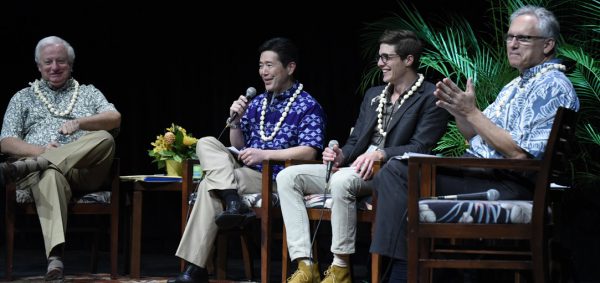
by HEC Team | Dec 7, 2016 | 2017, News
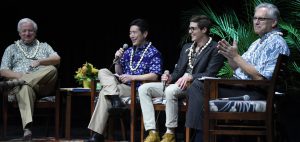 The program for the 2017 Maui Energy Conference is taking shape to explore a vibrant and clean energy future. Local, national, and international experts will tackle the following topics:
The program for the 2017 Maui Energy Conference is taking shape to explore a vibrant and clean energy future. Local, national, and international experts will tackle the following topics:
DAY 1
Resilience
How do we define resilience and sustainability? What do these look like? What strategies will get us to an energy system that is resilient? The challenge of achieving decarbonized energy production and maintaining a reliable, safe, affordable, secure and resilient energy system is formidable.
Water, Energy, Food Security Nexus: Connecting the Dots
We explore the nexus between agriculture production, use of water, and production of energy. With the closure of Hawaii’s last sugar plantation, what role will agriculture play in energy resilience? What are the possibilities for locally produced Biomass and Biofuels? What are the trade-offs in potential food security vs. energy security? In a global marketplace is food or energy security a myth?
Emerging Trends in Hawaii Energy Policy: Are We Sending Mixed Messages?
What market signals are policy makers sending to energy stakeholders? Is it possible to stabilize energy prices and electricity rates, reduce carbon emissions, and provide reliable, safe, affordable, and resilient energy all at the same time? What measures will policy makers implement to protect vulnerable populations?
Emerging Trends in Energy Policy: Nuclear Energy – Old Peril or New Promise
What are the social, cultural, legal, and economic challenges of decarbonization using nuclear energy? Does nuclear energy have a role in Hawaii’s energy future? We will present a critical discussion to address community concerns and fears regarding nuclear energy.
HNEI/GE Update on Renewable Energy Deployment
Hawaii Natural Energy Institute has engaged GE for over a year to address the effects on grid resiliency as Hawaii moves toward 100% renewable energy deployment. The presentation will update us on critical findings and mitigation measures that must be considered. What happens to system operability and reliability? What types of ancillary services will be required?
DAY 2
Creating a Resilient Energy Economy
What are the effects of shifting to a decentralized energy system? What are the impacts on jobs? What opportunities exist to incubate and commercialize new innovative energy entrepreneurs? Can innovative energy rate design and pricing help build a strong economy? How can tax policy and commercial incentives aid in this transition?
Technology: Is Storage the Key to Resilience?
We will discuss specific storage technologies and their contribution to resiliency. Are these systems ready for deployment and cost effective? Do they provide more than one function on the grid? Can customers provide support for their own electrical needs through storage, especially in a Distributed Energy Resources (DER) scenario?
Technology: Role of the Smart Grid
How will the “smart grid” add to grid stability and resiliency? Will the “smart grid” increase exposure to security breaches and what mitigation measures are needed to reduce risk? How can we secure customer’s personal information, including energy usage patterns?
Technology Panel: Innovations in Transportation
What steps can be taken to create and facilitate a resilient transportation sector? Are there unique issues for islands? What are the challenges and expectations in creating a resilient system? What are the costs/benefits of hydrogen, biomass and other alternatives?
Mobility: Getting a Move On
Air, ground, and marine transportation represents more than two thirds of the fossil fuel consumption in Hawaii. We will explore and discuss the opportunities and challenges in the transportation sector. What role can land use and urban planning play in reducing reliance on fossil fuels? What companies are leading in this area? What opportunities are there in the electrification of ground transportation?
The program includes keynote speakers, a session featuring case studies as well as plenty of time for viewing the exhibits and networking.
by HEC Team | Oct 17, 2016 | 2017, News
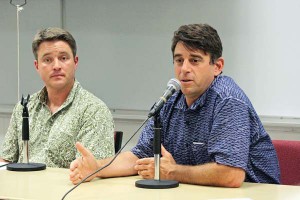
Rising Sun Solar co-owner Brad Albert (right) explains the growing need for energy storage alongside Jamie Cook, Maui Electric Co.’s director of renewable energy projects, during a panel on rooftop solar Thursday at Kaunoa Senior Center. Read the full story on MauiNews.com.
by HEC Team | Apr 20, 2016 | 2016, News
The 2016 Maui Energy Conference is airing on Akaku, Channel 55, and online via Akaku Maui Community Television Vimeo Channel.
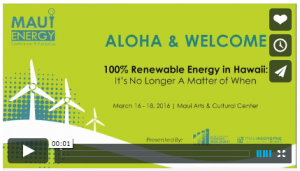
2016 Maui Energy Conference Videos
View Videos by Session:
Opening and Keynote Address by Governor Bill Ritter Jr. and Invited Presentation by Jon Wellinghoff
Session 1: Defining 100% Renewables
Session 2: Community Acceptance of 100% Renewables
Session 3: The Social Impacts of Pursuing a 100% Renewable Future
Session 4: Inquiring Minds Want to Know: Educating Toward 100% Renewable Energy
Session 5: Investing in Hawaii
Session 6: The Hawaii Renewable Experience: What Can Be Replicated Nationally and Internationally?
Session 7: Integration of Distributed Energy Resources
Session 8: Maui: A Case Study-Is This Where We’re All Headed?
Mid Conference Reflections from Utility Dive and the Program Committee
The Guernsey Report: An Analysis of Alternative Utility Models for Maui County
by HEC Team | Mar 24, 2016 | 2016, News
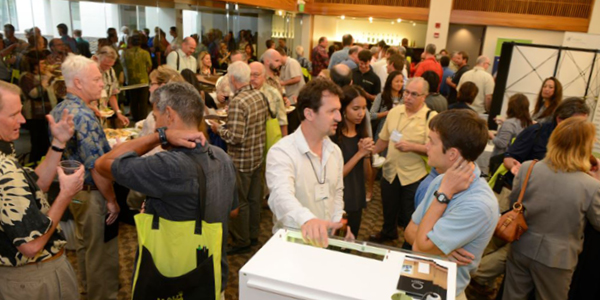
The Maui County Office of Economic Development and the Maui Economic Development Board wrapped up another successful Maui Energy Conference on Friday, March 18, 2016. The Conference attracted 340 participants, speakers and sponsors from Hawaii, the Mainland U.S., Japan and Canada. Below is a list of articles published by the press.
Experts: Hawaii can lead changes in the country’s renewable energy landscape – Lahaina News
Getting to 100% renewables: How Hawaii plans to get fossil fuels off the grid – Utility Dive
Maui Energy Conference: ‘How Did We Get Here?’ – Hamakua Springs Country Farms
Who Should Have Been Present At the Maui Energy Conference? – Energy Dynamics
Maui Energy Conference focused on change – Ililani Media
NextEra absent from energy conference on Maui – Honolulu Star Advertiser
An ‘energy revolution’ – The Maui News
Maui Energy Conference Looks to a Renewable Future – Ililani Media
Where Are You, NextEra Energy? – Honolulu Civil Beat
Is Hawaii Hampering Efforts To Reach Renewable Energy Goal? – Honolulu Civil Beat
Kauai Utility CEO: Renewable Energy Goal Not Cheap Or Easy To Meet – Honolulu Civil Beat
The 2016 Maui Energy Conference – Energy Storage Publishing
Maui Energy Conference to Explore Battery Storage – Maui Now
Maui Energy Conference Will Tackle Major Issues – Ililani Media
Maui Energy Conference – Energy Excelerator
Maui Energy Conference – Pichtr
2016 Maui Energy Conference – AIA Maui
Registration Opens for Maui Energy Conference – Maui Now
Hawaii’s energy future to be discussed at 2016 Maui Energy Conference – Lahaina News
by HEC Team | Mar 1, 2016 | 2015, News
The 2015 Maui Energy Conference saw more than 300 energy industry leaders from Hawaii, the Mainland and Japan exchanging ideas on how to better serve customers in today’s rapidly changing power generation and delivery environment. We are pleased to share video highlights that capture the flavor of the Conference!
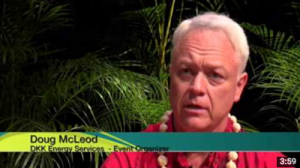
View Video
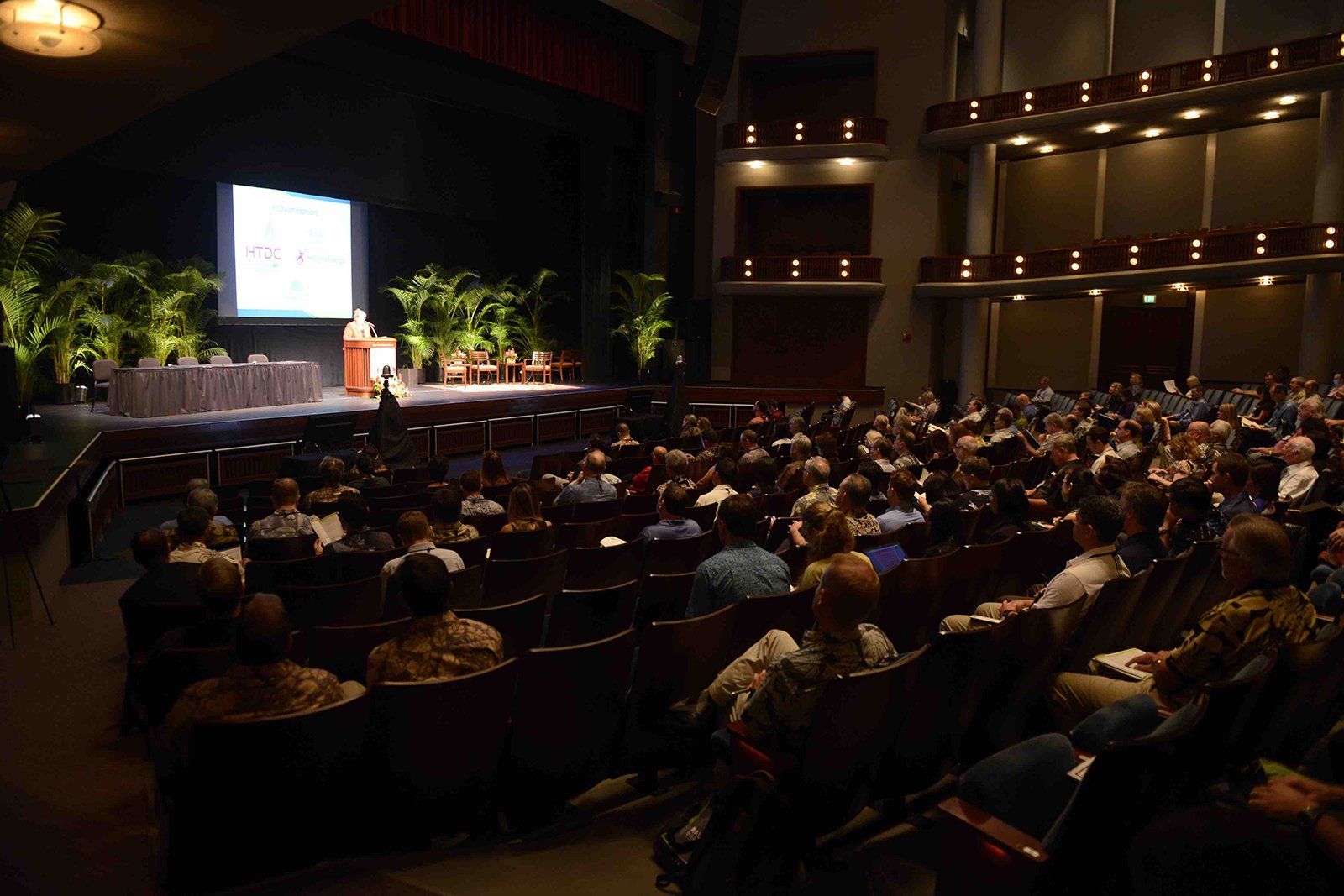
by HEC Team | Feb 17, 2016 | 2016, News
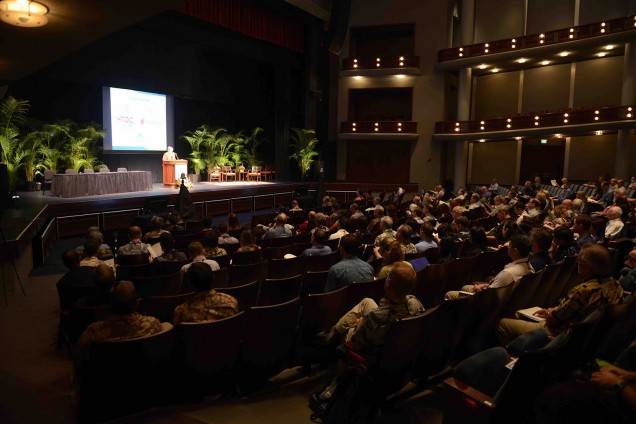
Join us at the 2016 Maui Energy Conference, March 16-18, at the Maui Arts & Cultural Center, for the hottest topic in renewable energy: battery storage. The current issue is figuring out how and where to use batteries in a way that makes economic sense. While many companies are vying to be among the very first to get their methods and products in actual use, we are pleased to announce that the two industry leaders, Tesla Energy from the U.S. and Sonnenbatterie from Germany, will speak at the conference. Boris von Bormann will be speaking for Sonnen and Greg Callman for Tesla Energy.
Learn about the cost of a battery storage system that could be offset by services provided to the grid. Hear also about community energy storage for customers who already have solar. “For me, it feels like we are on the verge of something big here,” said Conference Program Committee Chair Doug McLeod. “The equipment is no longer hypothetical. The manufacturers are ready to sell batteries that are designed to work with solar photovoltaic (PV) systems. The utility already has 15-20% of its customers with rooftop solar. The question is how it all comes together.”
The worldwide transition from fossil fuels to renewable sources of energy is under way. With the U.S. as a key global leader in the use of battery storage, you will hear firsthand how the upward trends for renewables are affecting our Maui economy and about the importance of battery manufacturing and storage. The conference sessions emphasize skills and knowledge in areas that are needed to offer renewable sustainability to businesses and to public and non-profit organizations.
“We are at an unusual moment in time when it comes to solar plus storage economics,” offered Sebastian “Bash” Nola, Renewable Energy Consultant and member of the Conference Program Committee. “The price of these batteries has fallen over the past few years, as has the PV cost, but the price of oil has fallen even faster. Battery plus solar now can produce power at a cost that a few years ago would have saved money for the average utility customer in Hawaii. However, all of us in the business are now trying to find places to use batteries that make economic sense at today’s lower utility costs.”
Better battery storage is crucial. Sun and wind energy are free, but because they are not constant sources of power, renewable energy is considered variable, affected by location, weather and time of day. Utilities need to deliver reliable and steady energy by balancing supply and demand. At the site of solar PV or wind turbines, batteries can smooth out the variability of flow, store excess energy when demand is low and release it when demand is high. For households, batteries can store energy for use anytime and provide back-up power in case of blackouts.
For some larger users of electricity, a battery might be able to pay for itself by reducing demand charges. It can level off a spike in demand by providing some of the power that would have been drawn from the utility. Also, under the proposed Demand Response Tariff, the utility would pay battery owners for providing services to the grid. In effect, many small power producers working together could become a ‘virtual power plant’, replacing some of the capacity of traditional oil-fired power plants.
At the conference you will learn about the many kinds of batteries available today. Depending on the function the battery serves, learn about the many different requirements for storage capacity, charging and discharging performance, response time, maintenance, safety and cost.
“Here on Maui, Haleakala Solar, Inc. has partnered with Sonnen while Rising Sun Solar has signed up with Tesla Energy,” said Frank De Rego Jr., Director of Business Development Projects, Maui Economic Development Board, Inc. and member of the Conference Program Committee. “We are grateful to Kyle Datta from Ulupono Initiative for putting together the panel with Tesla, which will consider how storage fits in the broader picture of getting to 100% renewables. We are also grateful that Sonnen has accepted our invitation to speak about doing business in Hawaii.”
REGISTER NOW

 The program for the 2017 Maui Energy Conference is taking shape to explore a vibrant and clean energy future. Local, national, and international experts will tackle the following topics:
The program for the 2017 Maui Energy Conference is taking shape to explore a vibrant and clean energy future. Local, national, and international experts will tackle the following topics:





